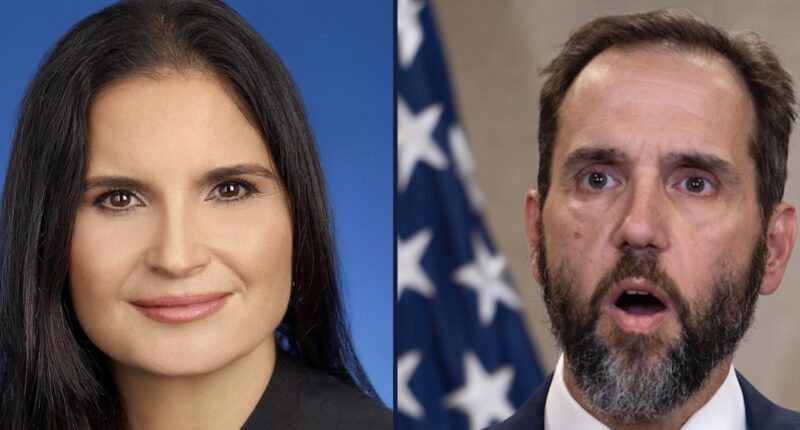Share this @internewscast.com
Left: Judge Aileen Cannon (U.S. District Court for the Southern District of Florida); Right: special counsel Jack Smith (AP Photo/J. Scott Applewhite, File)
A second nonprofit group is pushing for the public release of special counsel Jack Smith’s complete report on the Mar-a-Lago investigation concerning President Donald Trump’s alleged mishandling of classified documents after his first presidential term. They have called on U.S. District Judge Aileen Cannon to make a decision on their appeal to intervene and overturn an injunction she imposed 171 days ago. This order is currently being leveraged by the DOJ to counter a lawsuit from the New York Times.
Judge Cannon’s injunction on January 21, which prevented the release of Smith’s Mar-a-Lago report, highlighted that Trump valet Waltine Nauta and Mar-a-Lago property manager Carlos de Oliveira had an ongoing appeal in the 11th U.S. Circuit Court of Appeals. Therefore, they “retain — as all parties agree — due process rights to a fair trial that would be jeopardized by public dissemination of Volume II.”
“In short, the Department offers no valid justification for the purportedly urgent desire to release to members of Congress case information in an ongoing criminal proceeding,” wrote Cannon, the judge who dismissed the president’s Espionage Act case and invalidated Smith’s appointment as special counsel last July. “Meanwhile, on the other side of the balance, there are two individuals in this action, each with constitutional rights to a fair trial, who remain subject to a live criminal appeal of this Court’s Order Dismissing the Superseding Indictment.”
At the time of the injunction, the judge noted, the freshly installed Trump administration DOJ had yet to toss the cases against Trump’s now former co-defendants.
“The Department has not sought leave to dismiss that appeal, initiated by the Special Counsel, and there has been no indication by any government official in this case that the Department will not proceed on the Superseding Indictment should it prevail in the Eleventh Circuit or in subsequent proceedings,” Cannon continued.
Just eight days later, however, the DOJ, Nauta, and de Oliveira each agreed to dismiss the appeal, and charges were dropped. The 11th Circuit accordingly responded by jettisoning the case on Feb. 11, 150 days ago.
Nonprofit watchdog American Oversight is now notifying Cannon that it’s also been 90 days since it submitted its last reply in support of intervening and lifting the injunction. The filing came Thursday, three days after fellow would-be intervenor Knight First Amendment Institute likewise nudged Cannon to rule, as if to ask: What’s the holdup?
“To date, there has not been a ruling on American Oversight’s Motion to Intervene, and 90 days have elapsed since American Oversight filed its Reply,” American Oversight’s notice said. “American Oversight respectfully notifies the Court that its Motion to Intervene is ripe for adjudication.”
Love true crime? Sign up for our newsletter, The Law&Crime Docket, to get the latest real-life crime stories delivered right to your inbox
In an April motion to intervene, American Oversight argued that the Cannon’s injunction “obstructs” the group from “exercising its federal rights” to request Volume II under the Freedom of Information Act (FOIA).
“The Order was entered to protect the rights of individuals who were then facing a live criminal appeal and possible trial; they no longer face either,” the motion said, referring to Nauta and de Oliveira.
In March, the DOJ answered that the proposed interventions of the Knight Institute and American Oversight should be rejected and that the injunction should stay in place.
But even if Cannon were “inclined to lift” the injunction, she shouldn’t release the full version of Smith’s report because that decision is ultimately up to U.S. Attorney General Pam Bondi, said the government.
“The United States respectfully submits that the Court should deny the motions to intervene filed by American Oversight and Knight Institute in this closed criminal case. First, neither American Oversight nor Knight Institute has shown that this case fits within the narrow class of circumstances in which courts have previously allowed third parties to intervene in criminal cases,” the DOJ asserted. “This Court should not expand that class.”
As recently as Friday, however, the DOJ argued that the New York Times’ FOIA lawsuit for Volume II should fail — because of the injunction Cannon has for several months left untouched.
“The Complaint must be dismissed because the Times fails to state a plausible claim for relief under FOIA. DOJ did not ‘improperly’ withhold Volume II of the final report of former Special Counsel Jack Smith because Judge Cannon’s injunction bars DOJ from releasing it,” the DOJ filing said. “Well-established Supreme Court precedent supports DOJ’s position that it is unable to disclose the record under FOIA because of the injunction.”
In June, the New York Times called Cannon’s injunction a legal “nullity” that she didn’t have the jurisdiction to issue.
Calling the Trump administration’s “reliance” on Cannon’s injunction “fatally flawed,” the Times asked U.S. District Judge Gregory Woods III to order the DOJ to “complete processing of The Times’s FOIA request” and to move the “court in the Southern District of Florida to end or modify the injunction in light of DOJ’s FOIA obligations.”















